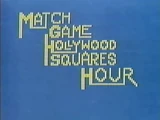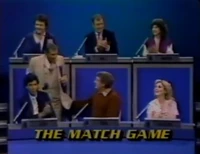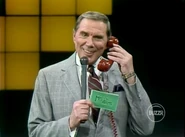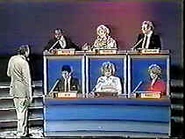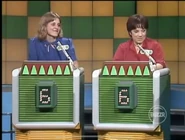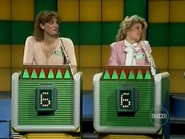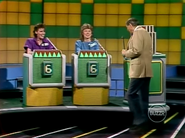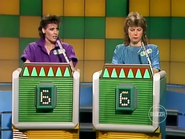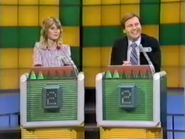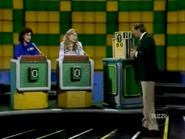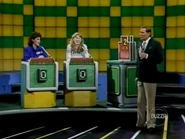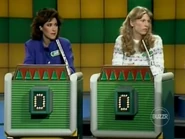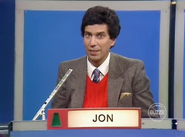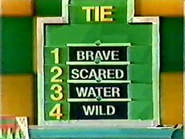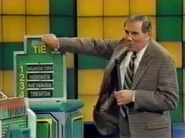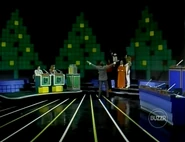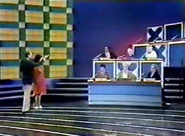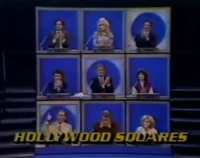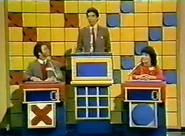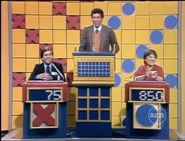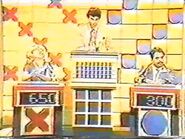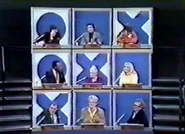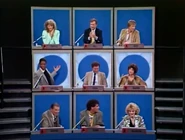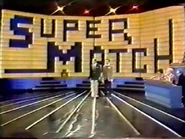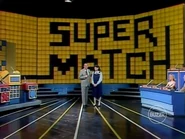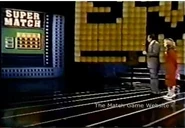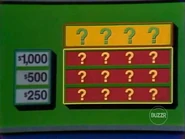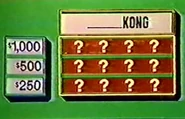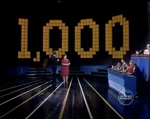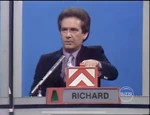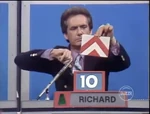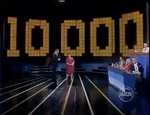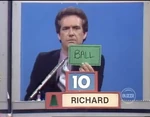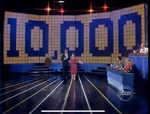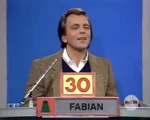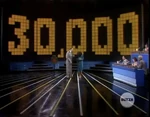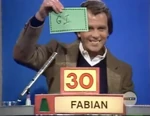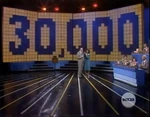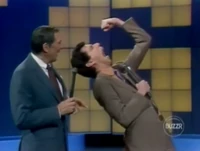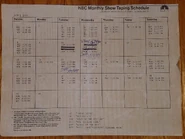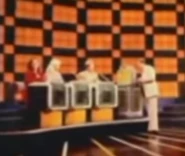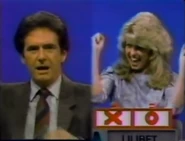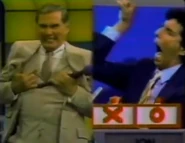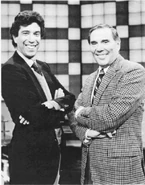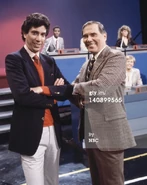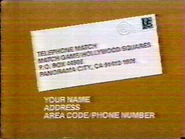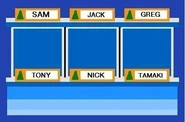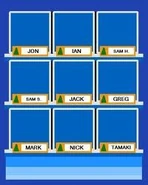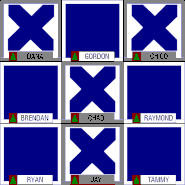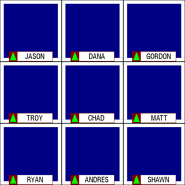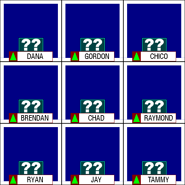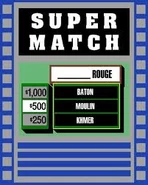| Hosts | |
| Gene Rayburn (Match Game portion) Jon Bauman (Hollywood Squares portion) | |
| Announcer | |
| Gene Wood | |
| Sub-Announcers | |
| Johnny Olson Rich Jeffries | |
| Broadcast | |
| NBC Daytime: 10/31/1983 – 7/27/1984 | |
| Packagers | |
| Mark Goodson Productions by arrangement with Orion Television | |
The Match Game-Hollywood Squares Hour was a fusion of Match Game and Hollywood Squares into an hour-long show.
Gameplay[]
Match Game[]
Two new contestants played the Match Game half of the show. As with the previous 1973–1982 run, the object of the game was to match as many of the celebrities as possible. At the beginning of each round, one contestant had a choice of two questions (A or B) leaving the other one for the other contestant. Each contestant was read a statement with a blank at the end or near the end. The six celebrities then wrote down their answers to fill in the blank. When finished, the contestant in control gave an answer of his/her own after which the stars revealed their answers. Each time the contestant matched he/she scored a point but each celebrity could only be matched one time.
Like Match Game PM, the game was played in three rounds and the player who had matched the most celebrities at the end of Round 3 won the game. If a contestant matched all six celebrities in one or a combination of the first two rounds, all subsequent rounds would be played alone by the contestant needing to catch up (they could only pick one question per round). If the game ended in a tie, a Super Match-style question was read and the contestants were shown four possible answers which were faced away from the stars. Each contestant chose an answer by number and then the stars one at a time gave verbal answers. The player whose answer was mentioned first won the game.
Telephone Match[]
A home viewer contest was played during "sweeps" periods in February and May of 1984. At the start of Round 2, Rayburn called one home viewer previously selected at random and awarded him/her $500. That viewer then played a Head-to-Head match against the celebrity of his/her choice, receiving an additional $5,000 and a walk-on role in an NBC daytime soap opera for making an exact match. It is assumed the winner would receive a trip to the NBC Burbank area or to NYC (if the soap was Another World, which taped in NYC at the time) if they won the Telephone Match. The contest ended once the Telephone Match was won five times. The Telephone Match was also a feature at some point during the 60s NBC's The Match Game as well.
Gallery[]
The winner of the game went on to play Hollywood Squares against the show's returning champion.
Hollywood Squares[]
In the Hollywood Squares portion, Jon & Gene traded places with each other and an extra tier swung in to make room for three more stars. As in Hollywood Squares all by itself, the object of the game was to get three stars in a row. They did that by agreeing or disagreeing with the stars' answers to questions; each time they did that correctly, they captured a square and scored $25, but each time they did that incorrectly, the square and money went to the opponent. The first player to get tic-tac-toe or get five stars won the game and more money. The first game was worth $100 and every game thereafter was worth $100 more than the previous.
What makes this Hollywood Squares different from all the other versions are these rules:
- The champion played X and the challenger played O. This was the only version where sex does not matter. This meant there was the possibly of a Ms. X and a Mr. Circle; or like some themed weeks on the stand-alone show, a Ms. X and a Ms. Circle, or a Mr. X and a Mr. Circle. This process was also done on Hip Hop Squares (2017 version) and Nashville Squares later in its lifespan.
- A contestant could actually win by default by having the opponent fail to block by missing the question. This applied even in the case of a five-square win.
- All questions were multiple choice & true or false, because Mark Goodson said no to writing bluffs for the celebrities.
- There was no Secret Square game.
When time ran out, a school bell rang, and the player with the most money by that time won the match. If the match ended in a tie, one final question was played with the star of the contestant in turn's choosing; if the contestant could agree or disagree correctly, he/she won the match; otherwise, the match went to the opponent. Both players kept the cash.
Super Match[]
The Super Match was mostly the same as the original down to the host, for Gene Rayburn took over once again, but the Audience Match amounts were increased, and all nine stars participated.
Audience Match[]
A prior studio audience was asked to give its best response to a fill-in-the-blank phrase, and its three best answers were placed and hidden away on a game board. Each one was assigned a dollar amount according to the popularity of each answer; the top answer was worth $1,000, the middle answer was worth $500, and the least popular was worth $250. Once the question was revealed, the winning contestant selected three stars who gave their answers to help out the contestant. When the answers were given, the contestant then chose which answer to use, or they could reject them all and give an answer of his/her own. When all was said and done, the answers were revealed one at a time starting with the least popular answer and ending with the most popular. If the contestant could match any of the answers, he/she won the money attached to the answer. If the player chose an answer that was not on the board, he/she earned $100.
Head-to-Head Match[]
The nine stars had numbered cards in front of them. Four of the stars had 10s, another four had 20s, but only one of them had a 30; those numbers affected the amount won in the Audience Match. The winning contestant chose which star to play with, at which point the chosen celeb revealed his/her number, and that number was multiplied by the Audience Match award won. Host Rayburn then read another fill-in-the-blank phrase after which the chosen star wrote his/her answer. The winning contestant then gave his/her answer after which the chosen star revealed his/hers and if they matched, the winning contestant won the grand cash prize, which was added to their Audience Match winnings (possible amounts of $1,100/$2,100/$3,100, $2,750/$5,250/$7,750, $5,500/$10,500/$15,500, $11,000/$21,000/$31,000).
In order to win the money, the contestant had to match his/her chosen celebrity's response exactly or it cannot be accepted, just like the stand-alone show; this meant that multiple forms of the same word, e.g. singular or plural, were usually accepted whereas synonyms were not.
During the short history of the show, the celebrity with the 30 was found a total of 15 times and the $30,000 top prize was won seven times, with only one contestant winning the top prize twice.
Champions stayed on the show until they won five days in a row (for a possible payoff of $155,000 plus their Hollywood Squares winnings) or were defeated. The highest total awarded during the run was $66,350. In the event of a retired champion, the three new players' positions for both Match Game and as the designated Hollywood Squares champion were chosen by lot. After the first five-time winner retired, they brought back a player from the first week who it was thought might have been disadvantaged in their original run.
During the course of the run, 3 contestants completely struck out of the Super Match (both bombing out of the Audience Match and missing an exact match on the Head to Head)
Pilot Episode[]
As the pilot episode has yet to surface, little is known about it. From the information that was and is available (pictures, appearances on television commercials), here is what is known: the basic games were the same, except three contestants played Match Game, with the lowest scoring one presumably being eliminated while the remaining two play Hollywood Squares. Unknown where returning champions would fit in here. The set had a few minor differences, the nameplates on the celebrity panel being grey instead of red as in the series, and the Hollywood Squares contestant/host area likewise being in shades of grey.
According to YouTube user "caholla," the Super Match played differently. "After the audience match, contestant picked a celebrity and either 'X' or 'O'. Celebrity pulled the 'X' or 'O' tab. Behind one tab was the celebrity's name, behind the other a dollar amount. If the tab pulled had a dollar amount, it was added to the pot for the head-to-head match; the contestant called another celebrity and 'X' or 'O'. If the tab pulled had the celebrity's name, contestant played the head-to-head with that celebrity for the amount in the pot. If contestant cleared the board, they played the last celebrity picked for $100k."
Gallery[]
Pilot Pictures[]
Other Pictures[]
Custom Designed Pics[]
Rating[]
Music[]
The main theme from this show would be reused as a car prize cue on The Price is Right (Barker) and the 1986 version of Card Sharks (Eubanks).
The "time's up" bell was the same one from Sale of the Century (Perry) and Supermarket Sweep (Ruprecht), and the generic bells were from the 1978 version of Card Sharks (Perry) as well as on Classic Concentration starting in late 1987. While a buzzer sounded for a mismatch in either game, the NBC Claxon signaled a mismatch in the Audience Match and the Head-to-Head Match.
The ticket plug would also be reused on The Price is Right (Barker) as a Showcase cue.
A revamp of the theme "Lottery" was used by WNEV-TV/WHDH-TV in Boston during the late 1980s and early 1990s as well as several local Illinois game shows; it can also be heard at the live stage show called The Price is Right Live!. Additionally, the theme can also be heard on the British version of TPIR (simply called The New Price is Right [Not to be confused with the American show of the same name]) hosted by Bob Warman which aired on the Sky channel from 1989 until 1990.
Studio[]
NBC Studios, Burbank, CA
Inventor[]
A fusion of formats based on Match Game by Mark Goodson & Bill Todman and Hollywood Squares by Merrill Heatter and Bob Quigley.
Trivia[]
This was the second version of The Match Game to be aired on NBC as the first one was aired in 1962.
This was the second hour-long Goodson-Todman game show (the honors of being first go to The Price is Right (1972 version) and the third goes to Family Feud (Combs) or more specifically Family Feud Challenge in 1992).
This show replaced another short-lived NBC daytime game/talk show hybrid, Fantasy hosted by Peter Marshall and Leslie Uggams.
Jon Bauman's first game show hosting gig was The Pop 'N' Rocker Game in syndication from 1983 until 1984.
Before this show, Jon Bauman appeared on the 1970s version of Match Game (Rayburn) as his Sha Na Na alter ego named "Bowzer".
While one host hosted the appropriate half of the show, the other host sat on the panel.
The centerpiece of the show is a giant light wall controlled by an offstage console. On the December 23, 1983 show, Gene pointed out that it contains 2,304 light bulbs.
At the time, the cast of Leave it To Beaver is one of the highest rated theme-weeks of the series.
Due to conflicting ownership rights between Fremantle (MG) and MGM Television (HS), The Match Game-Hollywood Squares Hour was never rerun from its cancellation after being off the air for more than 35 years, until February 17, 2019, when the show began airing on Buzzr, where a four-episode marathon consisted of episodes 002 through 005. It was added to the permanent schedule on September 30, 2019.
Then-current and future hosts Pat Sajak, Bob Eubanks, David Ruprecht, Chuck Woolery, and Arsenio Hall appeared during some weeks.
The now-defunct NBC Experience store in New York City used a picture from the pilot episode to represent Hollywood Squares on a mural featured on the store's floor. In it you can see that the Squares contestant/host area was in the same style of the series, only in shades of grey instead of the reds, yellows, and blues of the series set.
Additional Page[]
Match Game-Hollywood Squares Hour/Quotes & Catchphrases
Related Shows[]
MG Related[]
Match Game - the show that started it all.
Family Feud - its bonus round "Super Match" was the inspiration for the show and was hosted by its former panelist Richard Dawson in 1976 until 1985 and 1994 until 1995 respectively.
What the Blank! - an unsold pilot for FOX in 2004.
The Real Match Game Story: Behind The Blank - a documentary that aired on GSN in 2006.
The Life of Reilly - a film adaptation based on Save it for the Stage: The Life of Reilly in 2006.
Gameshow Marathon - Match Game was the 6th series in 2006.
HS Related[]
Hollywood Squares - The show that started it all.
Storybook Squares - A short-lived, kid-friendly version of Hollywood Squares that aired on NBC in 1969 and from 1976 until 1977.
E! True Hollywood Story: Hollywood Squares - an episode of the show dealing about Hollywood Squares in 2005.
Hip Hop Squares - A hip-hop/rap-themed version of Hollywood Squares that formerly aired on MTV2 in 2012 and on VH1 from 2017 until 2019.
Nashville Squares - A short-lived, country-themed version of Hollywood Squares that aired on CMT in 2019.
Links[]
Rules for The Match Game-Hollywood Squares Hour
The Match Game-Hollywood Squares Hour @ Game Show Utopia
David's Match Game-Hollywood Squares Hour Page
The Match Game-Hollywood Squares Hour at ClassicSquares.com
The Match Game-Hollywood Squares Hour @ Game Show Garbage
